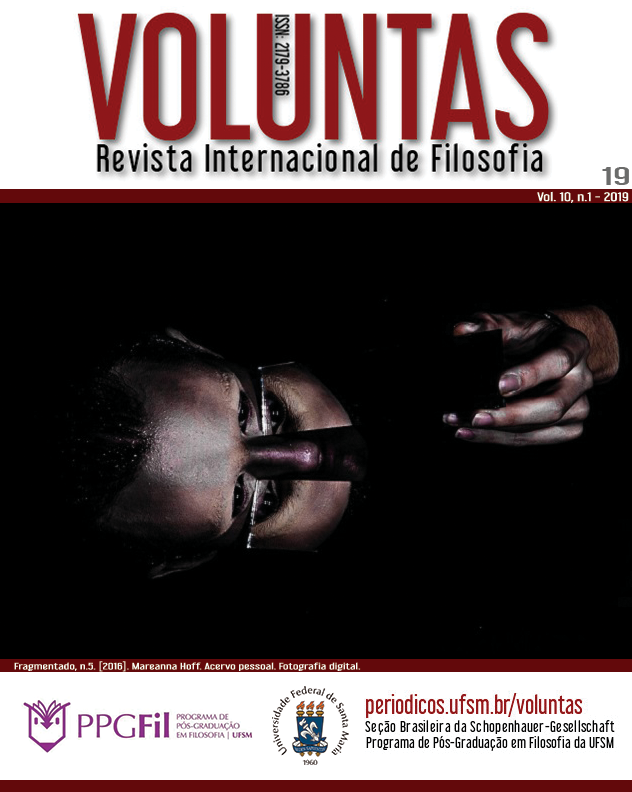Individuality in the moral sense and Eternal Justice
DOI:
https://doi.org/10.5902/2179378635585Keywords:
Vontade, Caráter, Justiça, Ética, IndividualidadeAbstract
This article has as its starting point another work from our own authorship, where we established the distinction between individuality in moral sense and individuation in corporeal sense, inside Schopenhauer’s philosophy. In that article, we admitted that our approach had found an obstacle in Schopenhauerian thesis of Eternal Justice. In order to remove such obstacle, we’ll now try to demonstrate that the Eternal Justice is incompatible with more fundamental elements of Schopenhauer’s philosophy.
Downloads
References
ANTONIASSI, Ednilson. Negação da vontade: a redenção na filosofia de Arthur Schopenhauer. Trabalho apresentado durante os Encontros de Estudo do Núcleo de Pesquisa Schopenhauer-Nietzsche. No prelo, 2018.
CARDOSO, Renato César. A ideia de justiça em Schopenhauer. Belo Horizonte: Argvmentvm, 2008.
FERRAZ, Marília Côrtes de. Liberdade e responsabilidade moral em Schopenhauer. In: PAVÃO, A. et al. (Orgs). Schopenhauer: metafísica e moral. São Paulo: DWW Editorial, 2014.
HUSSERL, Edmund. A crise das ciências europeias e a fenomenologia transcendental. Tradução de Diogo Falcão Ferrer. Rio de Janeiro: Forense Universitária, 2012.
JANAWAY, Christopher. Schopenhauer. Tradução de Adail Ubirajara Sobral. São Paulo: Edições Loyola, 2003.
MAGEE, Brian. The philosophy of Schopenhauer. Revised and enlarged edition. New York: Oxford University Press, 2002.
MCALLISTER, Ted V. Revolta contra a modernidade: Leo Strauss, Eric Voegelin e a busca por uma ordem pós-liberal. Tradução de Túlio Sousa Borges de Oliveira. São Paulo: É Realizações, 2017.
PAVÃO, Aguinaldo. Liberdade e responsabilidade moral: o fracasso de Schopenhauer. Caderno de resumos do I Congresso do Núcleo de Pesquisa Schopenhauer-Nietzsche. Londrina: UEL, 2018.
ORRUTEA FILHO, Rogério Moreira. Sobre a distinção entre individualidade moral e individuação corpórea. In: PAVÃO, A. et al (Orgs.). Schopenhauer: metafísica e moral. São Paulo: DWW Editorial, 2014.
ROGER, Alain. Atualidade de Schopenhauer, in prefácio a Sobre o fundamento da moral. In: SCHOPENHAUER, Arthur. Sobre o fundamento da moral. Tradução de Maria Lúcia Mello Oliveira Cacciola. São Paulo: Martins Fontes, 2001.
SCHOPENHAUER, Arthur. Der Handschriftlicher Nachlass, Band 4, 1: die Manuskriptbücher der Jahre 1830 – 1852. Ed. de Arthur Hübscher. München: DTV GmbH & Co. KG.
SCHOPENHAUER, Arthur. Die beiden Grundprobleme der Ethik. Ed. de Arthur Hübscher. Zürich: Diogenes, 1977.
SCHOPENHAUER, Arthur. Die Welt als Wille und Vorstellung, zweiter Band. Ed. de Arthur Hübscher. Zürich: Diogenes, 1977.
SCHOPENHAUER, Arthur. Parerga und Paralipomena. erster Band. Ed. de Arthur Hübscher. Zürich: Diogenes, 1977.
SCHOPENHAUER, Arthur. Parerga und Paralipomena. zweiter Band. Ed. de Arthur Hübscher. Zürich: Diogenes,
SCHOPENHAUER, Arthur. O mundo como vontade e como representação. Tradução de Jair Barboza. São Paulo: Editora UNESP, 2005.
SCHOPENHAUER, Arthur. Sobre o fundamento da moral. Tradução de Maria Oliveira Cacciola. São Paulo: Martins Fontes, 2001.
SCHOPENHAUER, Arthur. Über den Willen in der Natur, Ed. de Arthur Hübscher. Zürich: Diogenes, 1977.
SCHOPENHAUER, Arthur. Über die vierfache Wurzel des Satzes vom zureichenden Grunde. Ed. de Arthur Hübscher. Zürich: Diogenes, 1977.
Published
How to Cite
Issue
Section
License
The submission of original manuscripts to this journal implies the transference, by the authors, of the copyrights for printed and digital publication. The copyrights of a published manuscript belong ultimately to the author, and only the copyright for its first publication is reserved to the journal. Authors may only use the same results in other publications explicitly indicating this journal as the medium of the original publication.
Licence
Attribution-NonCommercial-ShareAlike 4.0 International (CC BY-NC-SA 4.0) - This license lets others remix, tweak, and build upon your work non-commercially, as long as they credit you and license their new creations under the identical terms.






